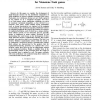533 search results - page 46 / 107 » Playing games with approximation algorithms |
IJCNN
2008
IEEE
14 years 2 months ago
2008
IEEE
Abstract—Acquisition and representation of semantic concepts is a necessary requirement for the understanding of natural languages by cognitive systems. Word games provide an int...
CDC
2010
IEEE
13 years 2 months ago
2010
IEEE
In this paper, we consider the development of single-timescale schemes for the distributed computation of Nash equilibria. In general, equilibria associated with convex Nash games ...
GECCO
2003
Springer
14 years 27 days ago
2003
Springer
Abstract. Most modern real-time strategy computer games have a sophisticated but fixed ‘AI’ component that controls the computer’s actions. Once the user has learned how suc...
ACHI
2009
IEEE
13 years 11 months ago
2009
IEEE
We present in this paper a web-based version of a Scrabble game, describing its architecture and some implementation details. This architecture makes possible a high degree of int...
SIGCSE
2002
ACM
13 years 7 months ago
2002
ACM
Designing a two-person game involves identifying the game model to compute the best moves, the user interface (the "view") to play the game, and the controller to coordi...



